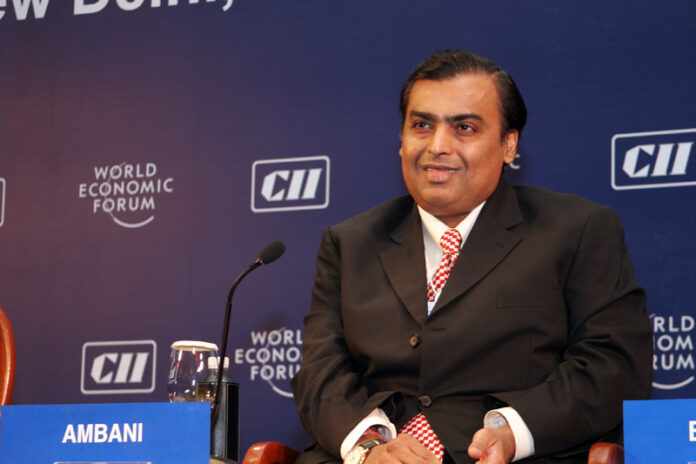Reliance Industries partners with Nokia, Tech Mahindra, and Microsoft to launch logic, aiming to transform Ghana’s 5G landscape
Mukesh Ambani’s Reliance Industries Ltd. is making its first major foray into Africa by launching a telecom venture in Ghana. NGIC, a Ghana-based company, will provide 5G broadband services to mobile operators and internet service providers. Radisys Corp., a subsidiary of Reliance Industries, will supply crucial network infrastructure, applications, and smartphones to support NGIC’s operations. Harkirit Singh, the executive director of NGIC, revealed these plans before the official launch announcement in Mumbai.
NGIC plans to start operations by the end of the year, offering affordable 5G services to boost digital connectivity in Ghana. “Our mission is to build affordable digital services in emerging markets,” Singh stated. Key strategic partners include Nokia Oyj, Tech Mahindra Ltd., and Microsoft Corp., which have all increased their focus on the telecom sector recently.
Embed from Getty ImagesGhana, a West African nation with a population of 33 million, currently has three main telecom operators: MTN Ghana, Vodafone Ghana, and state-run AirtelTigo. NGIC’s technological capabilities, strategic partnerships, and exclusive 5G license position it to build broadband services on a large scale, reducing costs for individual mobile carriers. “We hold Ghana’s only 5G license, which will be a game-changer for the country’s digital landscape,” Singh added.
The new venture is modelled after the success of Ambani’s Jio Infocomm Ltd. in India. Jio revolutionized India’s telecom market with low-cost data and free voice calls, becoming the largest mobile operator in the country. NGIC aims to replicate this model in Ghana, offering affordable broadband services and devices to the population. Ghana’s Minister for Communications and Digitalization, Ursula Owusu-Ekuful, expressed her support for the initiative, highlighting its potential to transform digital access in Ghana.
Ascend Digital Solutions Ltd. and K-NET, two African telecom firms, hold a combined 55% stake in NGIC. The Ghanaian government owns nearly 10%, with the remainder held by local mobile operators and private investors. Singh, who also serves as the CEO of Ascend, emphasized the importance of local involvement and investment in the venture. “Our focus is on creating value locally and ensuring that our services are accessible and affordable for all Ghanaians,” he said.
NGIC has secured the exclusive right to provide 5G services in Ghana for ten years, with a license valid for 15 years. The company’s capital expenditure for the first three years is projected to be $145 million. Singh mentioned that while Reliance and other strategic partners do not currently own equity in NGIC, there is an option for them to convert part of their payments into equity in the future. “Our goal is to demonstrate the value we can create before discussing equity involvement,” he noted.
The launch of NGIC is also seen as a diplomatic win for India, countering China’s growing influence in Africa through initiatives like digital inclusion. By partnering with local and international companies, NGIC aims to enhance Ghana’s digital infrastructure and create new opportunities for economic growth. “This partnership represents a significant step towards digital transformation in Ghana and beyond,” Singh concluded.
The announcement underscores Ambani’s strategy to expand Reliance’s global footprint and diversify its business interests. By entering the African market, Reliance aims to tap into the continent’s growing demand for digital services and infrastructure. The partnership with leading technology firms further strengthens NGIC’s potential to succeed in this high-growth market.
Analysis:
Mukesh Ambani’s venture into Africa through NGIC marks a significant move in the global telecom industry. From a political perspective, this initiative aligns with India’s strategy to enhance its influence in Africa, countering China’s dominance. By investing in digital infrastructure, India aims to strengthen bilateral relations and create new economic opportunities.
Economically, NGIC’s entry into Ghana’s telecom market promises substantial growth. The provision of affordable 5G services will boost digital connectivity, fostering innovation and entrepreneurship. The partnership with global tech giants like Nokia, Tech Mahindra, and Microsoft ensures that NGIC has the technological prowess to succeed. This collaboration highlights the increasing importance of digital services in driving economic development.
Sociologically, the introduction of 5G broadband services in Ghana can bridge the digital divide, providing more people with access to information and online resources. This access is crucial for education, healthcare, and business, particularly in rural areas. By replicating the success of Jio in India, NGIC aims to make mobile data affordable and accessible to a larger population, promoting social inclusion.
From a local perspective, NGIC’s operations will create jobs and stimulate local economies. The involvement of local firms and the Ghanaian government in the venture ensures that the benefits of this initiative are widely distributed. Additionally, the focus on affordable services aligns with the needs of the local population, many of whom currently lack reliable internet access.
Gender-wise, improved digital access can empower women by providing them with new opportunities for education and employment. Increased connectivity can also support initiatives aimed at addressing gender inequality, such as online training programs and digital platforms for women entrepreneurs.
For marginalized communities, NGIC’s services can offer new avenues for social and economic participation. Access to affordable internet can help bridge gaps in education and employment, providing marginalized groups with tools to improve their lives. The emphasis on affordable digital services ensures that even the most disadvantaged communities can benefit from this technological advancement.
In summary, Mukesh Ambani’s telecom venture in Ghana represents a multifaceted approach to digital transformation. By leveraging strategic partnerships and local involvement, NGIC aims to create value and foster growth in Ghana’s telecom sector. This initiative not only strengthens India’s diplomatic ties with Africa but also promotes economic, social, and technological development in the region.
